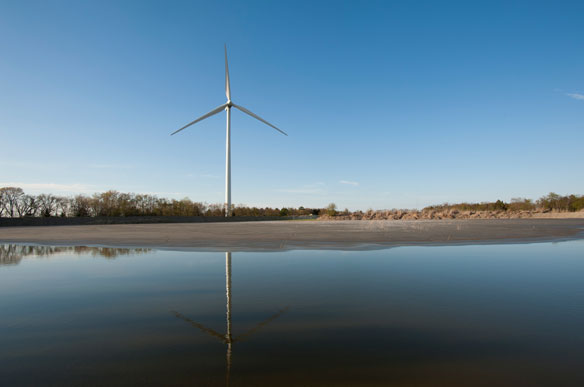
Delaware Sea Grant is supporting environmental and social science research designed to help communities that are involved in the review and development of offshore wind power. (Photo: Delaware Sea Grant)
By NOAA;
NOAA Sea Grant announced today grants totaling $15.9 million to support over 300 projects around the nation that help build resilient coastal communities and economies. Through university, state and other partnerships, Sea Grant Programs will supplement the federal funding with an additional $7.9 million in non-federal matching funds, bringing the total investment to more than $23.8 million.
“As more Americans depend on our nation’s coasts for cultural, economic, energy and recreational opportunities, ensuring the long-term vitality of coastal communities and economies is crucial,” said Leon Cammen, director of NOAA’s National Sea Grant College Program. “These grants support research, planning and outreach projects that will help coastal communities be more resilient to a range of natural hazards, water quality challenges, severe weather, energy needs and the effects of climate change.”
The projects are part of a larger effort by President Obama’s Administration to help reduce climate-related impacts on ocean, coastal and other resources and make our communities more resilient to climate change. To learn more, see the fact sheet released by the White House today on “Building community resilience by strengthening America’s natural resources and supporting green infrastructure.”
Sea Grant’s network of over 400 extension specialists will broadly integrate the research findings from these projects to help make their local coastal communities more resilient.
The federal funding will support four main priorities to:
- Develop mapping and modeling tools to predict coastal flooding and erosion from coastal storms, as well as research into the long-term impacts of these storms on property values. For example, a grant goes to North Carolina Sea Grant to work with communities to reduce the long term impact of coastal hazards in 13 counties using Sea Grant’s recently developed self-assessment tool, Vulnerability, Consequences, and Adaptation Planning Scenarios.
- Develop ecosystem modeling tools to help coastal communities forecast where harmful algal blooms and bacterial outbreaks such as vibrio are most likely to occur, enabling communities to ensure preparedness and resilience and to minimize impacts. For instance, Ohio Sea Grant is funding research on watershed and river discharge models to develop ways to predict how climate change and land use affect harmful algal blooms and public health impacts on drinking water.
- Research to improve community understanding of ocean acidification and other climate change-related effects on coastal communities, economies, fisheries and ecosystems. Changes in ocean chemistry can influence important ecosystem services, jobs, and economic activity such as the seafood industry and ecotourism. In Oregon, a grant will support research by Sea Grant to develop oysters that are more tolerant of acidic waters.
- Research to how best to take into account community values for coastal ecosystems during planning and development of renewable energy projects. For example, Delaware Sea Grant is conducting social science research to understand the factors that lead to community support or resistance to the Delaware and Maryland offshore wind energy project.
The full list of Sea Grant coastal resilience research and extension projects can be found here.
Sea Grant is a federal-private partnership of 33 programs based at top research universities in every coastal and Great Lakes state as well as Puerto Rico and Guam. Sea Grant leverages federal, academic, and industry partners to support communities impacted by coastal hazards. Sea Grant continues to invest in high-priority coastal resiliency research and engage communities through its integrated outreach program, bringing together the collective expertise of on-the-ground extension agents, educators and communicators to support the development of resilient coastal communities.








